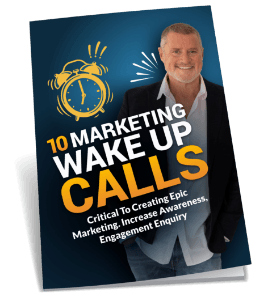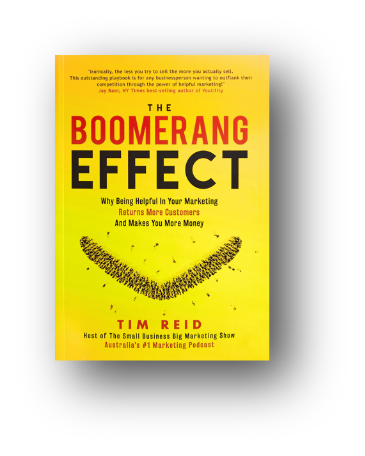Chemist Warehouse founder Jack Gance is Australian retailing royalty, with a personal wealth of $319M. Listen in as he reveals how he (and other family members) have built the empire.
“The average pharmacist hates us because we have effected the whole margin structure in pharmacy. If they compete with us 100%, if they match our prices, they’ll go broke. They want 35% margin. If they match our prices, they won’t even cover their rent. So, they pretend, or they just try to provide better service. So we’re not really liked in the industry.”
Jack Gance, Co-Founder, Chemist Warehouse
Jack really does stir the pot in this very insightful and honest chat as he takes us behind the scenes of how he and his brother built their pharmacy empire. Hit the PLAY button above to hear the full interview, where Jack Gance also shares:
- How an advertising contra deal enabled the creation of three iconic Aussie brands in Le Specs, Le Tan & Australis
- How building these brands funded the early years of the pharmacy empire
- How to find your strategic advantage
- How systems enable them to open 40 stores per year, each one taking only 10-days to set-up, with budgeted turnover of $10M each!
- What he believes the real definition of an entrepreneur is
A little bit more about Jack Gance
Jack qualified as a pharmacist in 1967 and alongside his brother, the pair purchased their first pharmacy around that time. In the 1970s and 80s, the Gance brothers established the iconic Le Specs, Le Tan and Australis brands before selling them in order to build their pharmacy empire which is now worth well in excess of a billion dollars thanks to the iconic My Chemist brand with 60 stores nationally, and Chemist Warehouse with 350 stores. Jack’s personal net worth was reported in 2016’s BRW Top 200 Rich List at $391 million. He is a stalwart of the Australian retail landscape, and is also the founder of the Family Business Association of Australia.
Jack Gance Interview Transcription
Tim Reid:
Our next guest Jake Gance who qualified as a pharmacist.
Hello, Jack Welcome! Good on you. Quick off the mark. Take a seat.
Jack gets qualified as a pharmacist in 1967 and alongside his brother. The pair purchased their first pharmacy around this time in the 1970’s and 80’s against brothers established the iconic Le Specs, Le Tan and Australia’s brands before selling them in order to build the pharmacy at their pharmacy empire.
The rest is pretty much history with Jack and his business partner finding enormous success with the My Chemist and Chemist Warehouse Group.
Please welcome, Jack Gance.
Jake Gance:
Thank you.
Tim Reid:
Now, Jack you started in pharmacy 40 years ago, but you very quickly decided to import Le Tan and Le Specs and Australias, was pharmacy not enough?
Jake Gance:
I enjoy the academic aspects of pharmacy, but I didn’t really enjoy the business aspects of working inside the pharmacy. I want something a bit of a challenge
Tim Reid:
Very entrepreneurial back then. I don’t think it exists, did it? If it did it was a dirty word.
Jake Gance:
Yes, it is. It is in some cases, but what is the definition of entrepreneurship?
Tim Reid:
I knew you ask it. I don’t know, Jack. What is it?
Jake Gance:
Well most people think that it is someone that takes a risk, but in fact one entrepreneur It doesn’t take a risk. An entrepreneur in fact mitigates the risk and does things in a way that makes sure that they don’t have as little risk as possible and that’s the difference between entrepreneurs and true entrepreneurs. True entrepreneur doesn’t take risks.
Tim Reid:
Unusual question, what did your parents think back then? Because they you know you’ve studied hard. You’ve gone too far. You’ve qualified as a pharmacist.
Jake Gance:
My parents want me to be a doctor.
Tim Reid:
They weren’t happy, right?
Jake Gance:
Well, it was the second choice.
Tim Reid:
I just want to hear around the room. I don’t think there’d be anyone who doesn’t know Australia’s Le Tan and Le Specs just put your hand up if you’re young enough to not actually they would be. There you go. It’s like these were iconic iconic Australian brands. Why? How?
Jake Gance:
Well, it was I guess it started with an urge to do something different to have a business challenge and we had pharmacies. We have two pharmacies and we started importing sunglasses for our own stores and we decided to use I guess the strategic advantage we had which is being a pharmacist to selling sunglasses to other pharmacies.
I think when I speak you I said that if you’re in business you should always look for a strategic advantage. Is that point getting involved in any business venture. We don’t have a strategic advantage because if you do people with that strategic advantage with bloody noses when they’re fighting each other. So, there must have been three or four hundred people selling sunglasses to pharmacy, but we had the unique point of difference which was that I was a pharmacist. I was selling to my fellow pharmacists and that’s how we started and that gave us the distribution.
Tim Reid:
So, your strategic advantage with those three brands was the fact that you know them before?
Jake Gance:
No, before we started. Before we developed the Le Specs, we sold very basic sunglasses on a price point, but we sold them on the basis that we were fellow pharmacist. Why buy from the multinationals? Buy from us because we can provide you the same product at a much better margin for yourself and they believe us because we are that’s the way.
Tim Reid:
You are part of them.
Jake Gance:
That’s right. We’re part of that part of them.
Tim Reid:
Would it be too simplistic to say and I can remember the Le Tan commercial because it was a lovely lady in a bikini sitting on the sunglasses. Oh no that was Le Specs, but would it be too simplistic to say that the advertising campaigns that supported these brands are allowed a major reason why they became iconic?
Jake Gance:
Well, I think it was a matter of a number of things. Firstly, it was a product itself. I mean up until about 1978 we were gradually growing our market share in sunglasses to other pharmacies. It wasn’t until 1979 we were in a trade show in Paris and my wife Evelyn saw a pair of sunglasses on the back of the stand that was quite different and it had a pair of hanging off it and we said to the guy what is this and is this a new unbreakable product.
So, we brought it back and went to an advertising agency. We said we can’t afford to pay, but privatizing. We won’t advertise and I read a book by John Singleton that talked about counter advertising. We said we want to do this on a counter advertising basis and so, they designed the advertising campaign and they designed the they actually gave the name Le Specs and they produced the point of sale and the TV campaign and that’s what really got us from point of where we had about 10 percent market share at about 30% overnight because the campaign was so fantastic and the product was quite so unique and different, but like an entrepreneur we didn’t spend half a million dollars on TV advertising. We did on the basis that we paid so much per pair that was sold and that’s what gave us the start.
Tim Reid:
It was a pretty good deal.
Jake Gance:
At that time, it was a very good deal and they did well and we did.
Tim Reid:
They would’ve done very well.
Jake Gance:
They did well and we did well.
Tim Reid:
And the same goes for Le Tan and Australias?
Jake Gance:
Well, after the first year, we were able to look at the market and we said: Well, first of all there is no national TV station. We used Victoria initially. So, to do it nationally, we would have had to done deals with every state. It would have been too complicated and we knew that it was going to be successful. So we’re prepared to put our money behind it, but the initial year where we didn’t know we didn’t risk anything.
Tim Reid:
You sold those three brands in 1991.
Jake Gance:
91. Yeah.
Tim Reid:
Why?
Jake Gance:
It’s a good question.
Tim Reid:
Is that a sign, I wish I hadn’t? or it was time?
Jake Gance:
Well, I mean it is. I mean you know sometimes, I wish I hadn’t, but we got enough we couldn’t refuse and at that stage you know the bigger you get, the more debt you have, the more risk you have. We had a product that was French and it was a French nuclear testing and we thought if this you know if they ban French products. What’s going to happen. So, we were you know I guess you know my kids weren’t very happy even when wasn’t very was particularly happy either, but when I got an offer that you can’t refuse, you can’t refuse. So, we sold it and it was a bittersweet situation.
Tim Reid:
But now, I mean given what’s happened since then copies of all those different products are rife.
Jake Gance:
Well, those copies back then. But yeah.
Tim Reid:
Right. Not as much.
Jake Gance:
Well, not as much anyway. So, we sold the brand. We sold the company and we have 35 stores at the time. I went back and did an MBA and then we developed My Chemist and Chemist Warehouse was it developed in 2000.
Tim Reid:
Well let’s talk about that because anyone else have a fetish about going to Kim? I love going to is it chemist warehouse? Yeah. There’s a lady. It’s weird. I just thought I was the only one. It’s just the two of us or is there a roomful of people who like going to chemists?
Jake Gance:
Why not shop at a store?
Tim Reid:
Do you have a name for that?
Jake Gance:
What’s that?
Tim Reid:
That feeling of I just love going to Chemist’s Warehouse. It’s very unusual.
Jake Gance:
It’s a unique experience. I think you know I mean when we have about Chemist’s Warehouse we weren’t really sure when was going to work because we took a big big punt. I know entrepreneurs don’t normally take risks or at least true entrepreneurs don’t, but we had we had but that’s actually about 35 stores and we figured that we can try and we can we can try this model where we give a big discount, have big volumes, have big stores and try to reduce the overall cost of operating the business. The two biggest costs in a pharmacy for any business is wages and rent and we took second real locations biggest stores and the whole idea was that we were going to have a higher volume at lower rental facilities so that we could reduce those two expenses and it worked. I mean the average pharmacy makes 35 percent gross margin and we dropped our prices by 25 percent across the board. So, it didn’t leave a lot of margin so went to buy better, when to have a better supply chain, where they have a higher average turnover. So, the average pharmacy today even today that’s about one and a half million dollars turnover and we were doing about 10 million dollars then.
Tim Reid:
Per pharmacy? Wow.
Jake Gance:
We’ve got still it to 30 up to 40 million.
Tim Reid:
Just to understand that because you’re saying you had 35 stores within My Chemist store?
Jake Gance:
My Chemist store.
Tim Reid:
Okay. Which was a run of the mill.
Jake Gance:
It was step above the other stores.
Tim Reid:
It was like an Amcal?
Jake Gance:
Was like an Amcal. We had probably more fun a shop’s product.
Tim Reid:
It was products priced at a point it was not a lot of discounting.
Jake Gance:
There was no discounting. We had a pseudo discount. We had deals and we had promotions and we had a loyalty club where we gave money back.
Tim Reid:
So, did you almost create a gap in the market with My Chemist. You’ve kind of all of a sudden there is an opportunity to create literally a Chemist Warehouse and is that how the idea formed?
Jake Gance:
Well, the idea came if we could have a pharmacy that was doing 10 to 15 million dollars turnover and the efficiencies would be greater. We could have offered a 25 percent discount on every product we sell and still make margin. So, that’s what it was a big risk because if we didn’t achieve the numbers we get away the discount, we go broke.
Tim Reid:
You go there and you’re cannibalizing My Chemist, aren’t you?
Jake Gance:
Well surprisingly didn’t really cannibalize My Chemist and we drew from a bigger catchment area. My Chemist was really a community store that people would go you know we’d have three or four in a suburb mini ponds we have three My Chemist stores, but now with Chemist Warehouse we tend to have a larger catchment we have fewer stores in an area.
Tim Reid:
I imagine you would have got a fair bit of flak from various quarters because I imagine I mean every business I mean a lot of business owners are scared of thinking out of the box and taking risks because someone might say something.
Jake Gance:
The average pharmacist hates us because we have affected the whole margin structure in pharmacy. They’re all trying to compete with us. I mean if they compete there’s 100 percent if they match our prices, they’ll go broke because they can’t because they want 35 percent margin if they match up prices that won’t even cover their rent. So, they pretend or they just provide better service or try to do. You know I mean so we’re not really liked in the industry.
Tim Reid:
Tell me. You mentioned and service you mention you know the model of My Chemist or the Amcal Chemist is offering great service. I notice a consumer that when I go to JB Hi-Fi. I don’t think the service is that great. When I go to a chemist warehouse, I actually think the service Chemist Warehouse has improved in the last couple of years. I don’t know whether I’m just noticing that, but as you do you have a service policy of just get them in and get them out? Or is there actually some science behind what you say to your staff.
Jake Gance:
We do a lot of training. I know Chris was saying about the training. A training is very important. We do a lot of training and I think it’s the culture of the organization. I mean everyone that works in the chemist warehouse the owners have all got through a program where they were sued and became a trainee and then they became a manager and they became a partner. So, we have 140 partners and those partners run individual stores and there’s a culture of ownership you know in those stores.
Tim Reid:
When you say a partner is that often they have financial equity?
Jake Gance:
Financial equity. Yeah! So, we have about 140 people that have a financial equity and they work individual stores. They might work two or three stores and that’s one of the reasons because the partners they’re like the owners there and they have been through the whole of the program saying as a student trainee and then become a pharmacist manager and then a partner and so the culture is very strong. Customer service you know focus on the customer and provide all the support.
Tim Reid:
Warren Buffett just sold down 900 million dollars’ worth of Walmart shares that he’s holding on to? Citing a nervousness with retail. What do you think? I’ll get you to get your crystal ball out now. I mean a threat to you must be the Internet.
Jake Gance:
Well it is. I mean we’re the biggest pharmacy on the Internet we do about 200 million dollars a year on that which is still a very small percentage of our business. The Internet certainly is a threat and you know and we’re concerned about what’s going to happen with Amazon coming into the marketplace, but a lot of the products that we sell there’s an immediacy thing you know and when they work in it we’ll get to our stores. There’s a whole theatre in that. I mean there’s a lot of noise a lot of signage. It’s a very busy environment very crowded and it’s that sort of atmosphere. You know there’s no doubt what we what our offering is our offering is lot of variety a lot of product at very good prices and we provide good service as well.
Tim Reid:
Do you have people in a backroom sort of planning what to do about that threat?
Jake Gance:
To be honest, no we haven’t taken a lot. Well you know we focus on our own issues rather than looking around. I mean we don’t really take a lot of notice of what everyone else does. We run our own our own game.
Tim Reid:
Let’s talk inspiration. You’re a successful businessman yourself. Where do you where have you sought inspiration in the past from anyone or anything?
Jake Gance:
Well, I think you know like Chris was saying he doesn’t like to copy things. I think that the plagiarism saves a lot of time. So, we see things all over the world and we adapt them. You know I mean you get an idea you go to a trade show try a trade show and you might see something that works for you that you know I mean you know I get excited about seeing something at a trade show something different. We try to adapt it.
Tim Reid:
And what is there a process of adaption I’m always interested in where you know you see an idea getting it into the marketplace getting it into your business. Is that an easy thing?
Jake Gance:
Well, I doubt that. I mean with the 450 stores you know and the sort of scale we’re at it’s a lot harder to bring things in because you’ve got to follow a process and as you know because we have a process that it becomes I mean all our stores are planogram. So, you know if you want something if you want to sell something through our stores it has to have a place. You can just say I’ll put it on the counter there’s no counter space. So, it takes a lot more work and yeah, we have to make sure that you know that it is going to fit into the environment and that it and that it’s going to add value to our business.
Tim Reid:
There is an incredible consistency about Chemist Warehouse?
Jake Gance:
We hope there is.
Tim Reid:
Seems to be managed within an inch of its life almost.
Jake Gance:
Well, that’s it not to that extent I mean, but we do it we are we have teams that go around and do store inspections and they get marked down for you know inconsistent signage and for not following the process. I mean one of the things that’s important for our industry is to get support for the manufacturers and get support manufacturers. You have to have consistency you have to have every store has to. If you say you’re going to have a go gondola end you’ll get like 100,000 dollars gondola end. We have to have that gondola end and same way in every store. Yeah. Now that doesn’t work with Amcal because they’re individual owners and there’s no corporation that sort of runs it. There’s no planogram price line to some extent but in our stores, they know that if they if they do a deal with us we’ll buy 100,000 units that will be in every store. It will have a facing it will have support and it will be on the television sets. It will be in the window it will be on display and that’s important. Consistency is really really important to be able to get the support of the manufacturers.
Tim Reid:
What a move on talk about family. You started the family business association of Australia, is that correct?
Jake Gance:
I did, yeah!
Tim Reid:
And family has been an integral part in running My Chemist and Chemist Warehouse?
Jake Gance:
Well, my brothers involved. My nephew is now involved. Evelyn has always been involved. My partner Mario whose two brothers are involved and he’s got half his family there.
Tim Reid:
Does it make business easier or harder?
Jake Gance:
Both. I mean the thing about family. A family business is that you can have loyalty, loyalties you’d expect loyalty with the family and that’s what that’s a given. Then, it’s being able to get the person to work to the level that they’re good at. I mean not everybody you know uses is as brilliant as you like and not everyone has skills and I think the trick is to be able to balance you know the inconsistencies with the ability with the benefits of having loyalty and honesty and integrity that is just unquestionable. If it’s a family member.
Tim Reid:
Is it easier or harder to have those conversations? Because if it’s someone’s not a family member in a business you can kind of go you know things aren’t working out you know. You either need to pick your socks up or we’re going to need to find someone else. Whereas with family, there’s something more at stake isn’t there.
Jake Gance:
Well, as with family is that sometimes people feel I will never be able to achieve a position because the family members always going to get the job and that’s a difficulty. I mean like you know family business Australia has a lot of courses and training about the balance between you between picking people to run the business based on ability and family. You know this you know there is advantages in both and you’ve got to have the right mix and balance and not everyone is good at running a business just because you don’t happen to be the entrepreneur that started the business doesn’t mean that you’re going to be any good and often your father’s going to have second guesses about you and thinks everything you do is useless and no good anyway. So, it makes it very hard. Other people say that their kids can’t do any bad and if the kids do whether it’s good or otherwise is fantastic, but everyone says that’s not true.
Tim Reid:
I’m going to open up to questions shortly, but I’d love to know technology in Chemist Warehouse stores. What role does it play?
Jake Gance:
It’s very important. We have control around technology. We written their own point of sale. We’ve written our own data base.
Tim Reid:
What would you do that? Surely, they’d be off the shelf solutions.
Jake Gance:
There was. It’s actually the I mean when you’re at the scale that we are we just write our own our own dispensing system was costing us half a million dollars a year in support before the dispensing system. We rent our own and the advantage is that we can control it if we want to do tweaks if we want to do any changes, it’s in-house and we can do it.
I think it’s really really important for us that we’re actually able to control it. So, if we were to make changes, we just we make them and it flows through to the stores. We have a very robust network. We have two data centres that have shadows of our IT system that are connected by fibre optic cable. We have a fibre optic cable to every store.
We control the computers in the store and head office. We have a team of about 50-60 technicians that work on support go out and set up that you know we set up our own to set up a store. We set up a store within 10 days so we have the bare walls, we can set the shelving, the telephone system, the computers, socket, cameras within 10 days.
Tim Reid:
How many stores you’re opening in a year?
Jake Gance:
About 40 a year and we do it. We do them in about each one in about 10 days.
Tim Reid:
How exciting! Who’s got a question for Jack?
Here’s what caught my attention from chatting with Chemist Warehouse founder Jack Gance:
-
- The advertising contra deal that he struck with an advertising agency in order to promote Le Specs. Without it, he and his brother couldn’t have built that brand to the iconic brand it became. What mutually beneficial contra deals could you strike?
- The importance of systems. We’ve covered this a few times on previous episodes, but it can’t be overlooked. Jack’s opening 40 stores a year, each one taking only 10 days to set up! You can’t do that without impeccable systems.
- The haters gunna hate. Although he only briefly touched on it during the interview, I’m guessing Jack and his team endured quite a lot of criticism as they established Australia’s largest chain of discount chemists. Whilst I’m the first to support small business, and hate seeing the little guy get buried by the big guys, I’m also a big supporter of seeing small business grow big … into the empire they deserve to be ;0
But the marketing gold doesn’t stop there, you’ll also:
- Discover how to break through procrastination and get your next marketing idea off the ground
- Revisit a recent episode in which we caught up with Peter Hitchener, Australia’s #1 TV newsreader who’s nailing social media
Other resources mentioned:
Please support these businesses who make this show possible:
Dale Beaumont’s 52 Ways – An amazing free 1-day live event for business owners where you’ll discover 52 ways to boost your business profits. Seats are limited. Book now.
Dragon Voice Recognition Software – It converts whatever you say into text. You download the software, start talking and your words appear on your screen. Which means you can create documents, blog posts, emails, reports & spreadsheets in a third the time; because we speak three times faster than we write. Get 35% off at GetDragon.com.au
If some thing in this episode of Australia’s favourite marketing podcast peaked your interest, then let me know. Leave your thoughts below.
May your marketing be the best marketing.
Timbo Reid
Want to subscribe to The Small Business Big Marketing Show?
Subscribe FREE on iTunes or Android




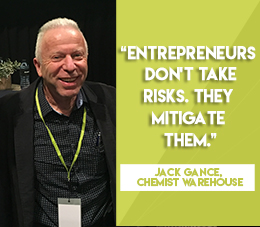




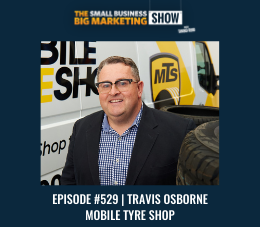
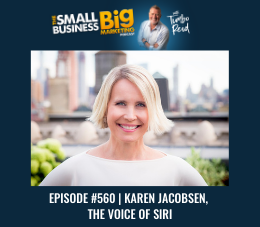
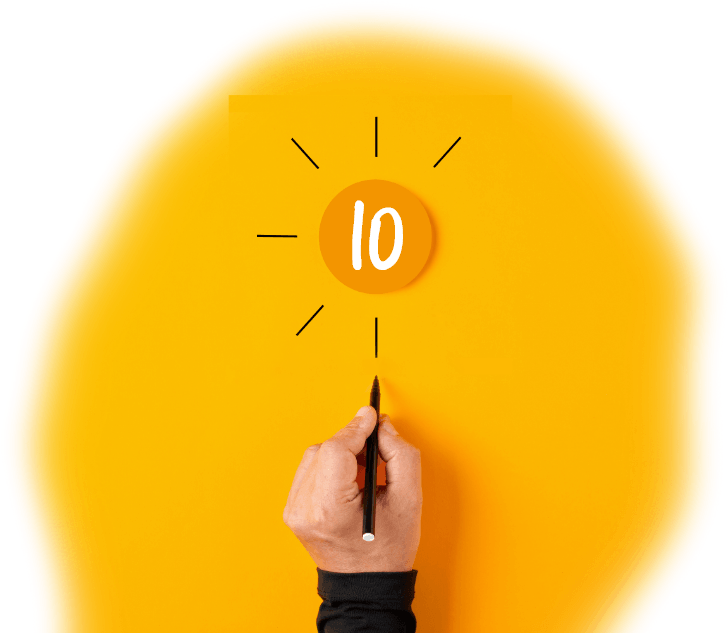
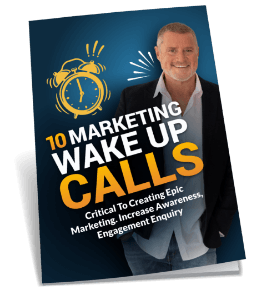
 Grab My 10 Marketing
Grab My 10 Marketing